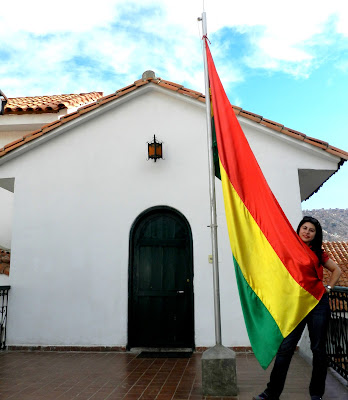 The bolivianos I got to meet have a particular sense of pride for their nationality and cultural background; even though they constantly complained about the numerous social problems and constant conflicts around the country, (some even say that peaceful times and consensus are not a characteristic of Andeans). From their early beginning as a Country, they have suffered a wide range of military coups, government changes and/or dictatorships. Evo´s presidency has not been the exception. Himself started his political career involved in several protests and strikes against governmental decision.
The bolivianos I got to meet have a particular sense of pride for their nationality and cultural background; even though they constantly complained about the numerous social problems and constant conflicts around the country, (some even say that peaceful times and consensus are not a characteristic of Andeans). From their early beginning as a Country, they have suffered a wide range of military coups, government changes and/or dictatorships. Evo´s presidency has not been the exception. Himself started his political career involved in several protests and strikes against governmental decision. Protest and social movements have become an important part of Bolivian culture. With all that is involved, the color ful and protest songs, homogeneous outfits and banners are certainly shocking to foreign visitors. There has not been a time that during a protest, you see some people shooting photos to the crowd. The validity of each one is a matter of long and opposite discussions, but the fact of looking at indigenous groups marching and demanding better living conditions make you have a sense of sympathy to their causes.
That takes me to my year coming back to Canada. After almost a year in Bolivia, you are visually shocked to see things so organized and calm, way different landscape to La Paz. The daily street life is very different, even though people in Canada are more considerate to pedestrians, and generally a cleaner and organized layout in the streets, it lacks that sense of authenticity and culture that is so vibrant and alive in La Paz.
The culture shock was stronger for me as I am a Latin American myself, not standing this as a rule, generally speaking, you can find more commonalities and comfort with your own that others. A year has flown now, and I still feel a big connection with Bolivia, it has become for me my third home.

No comments:
Post a Comment